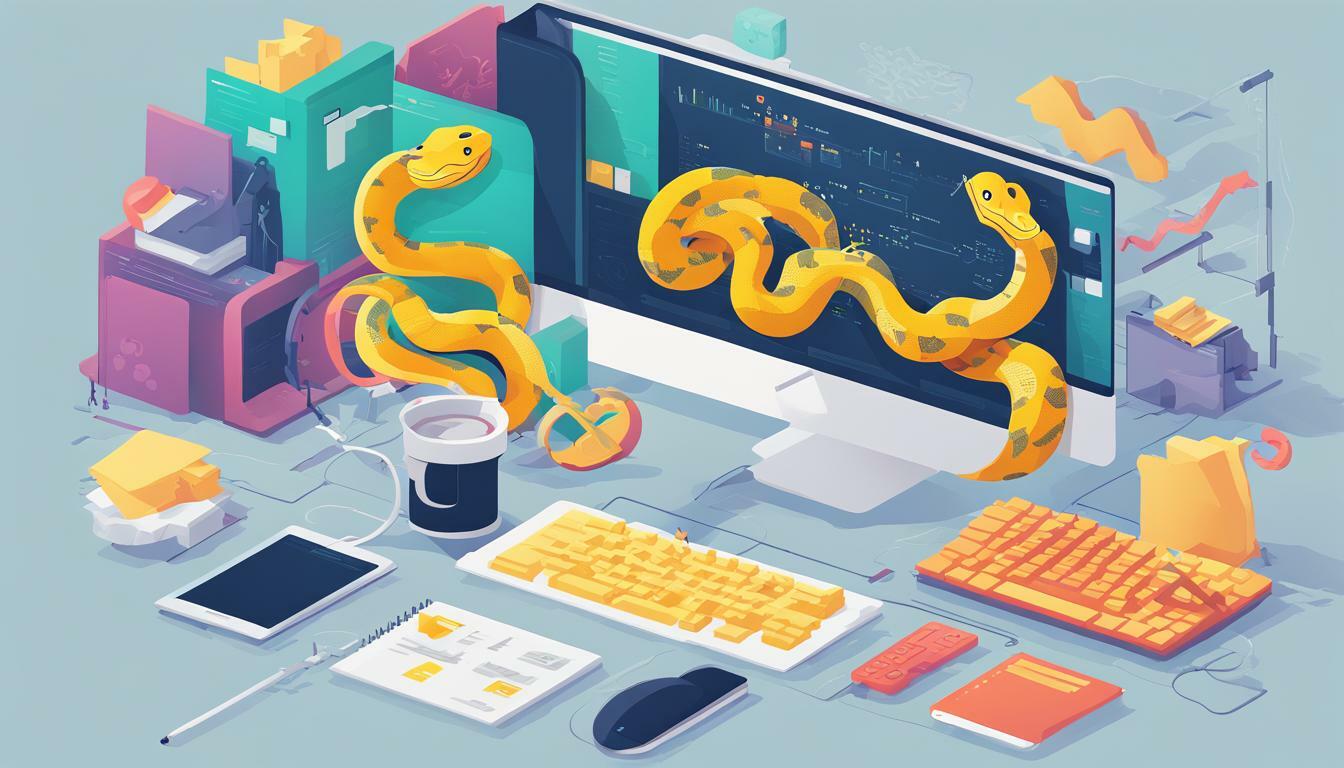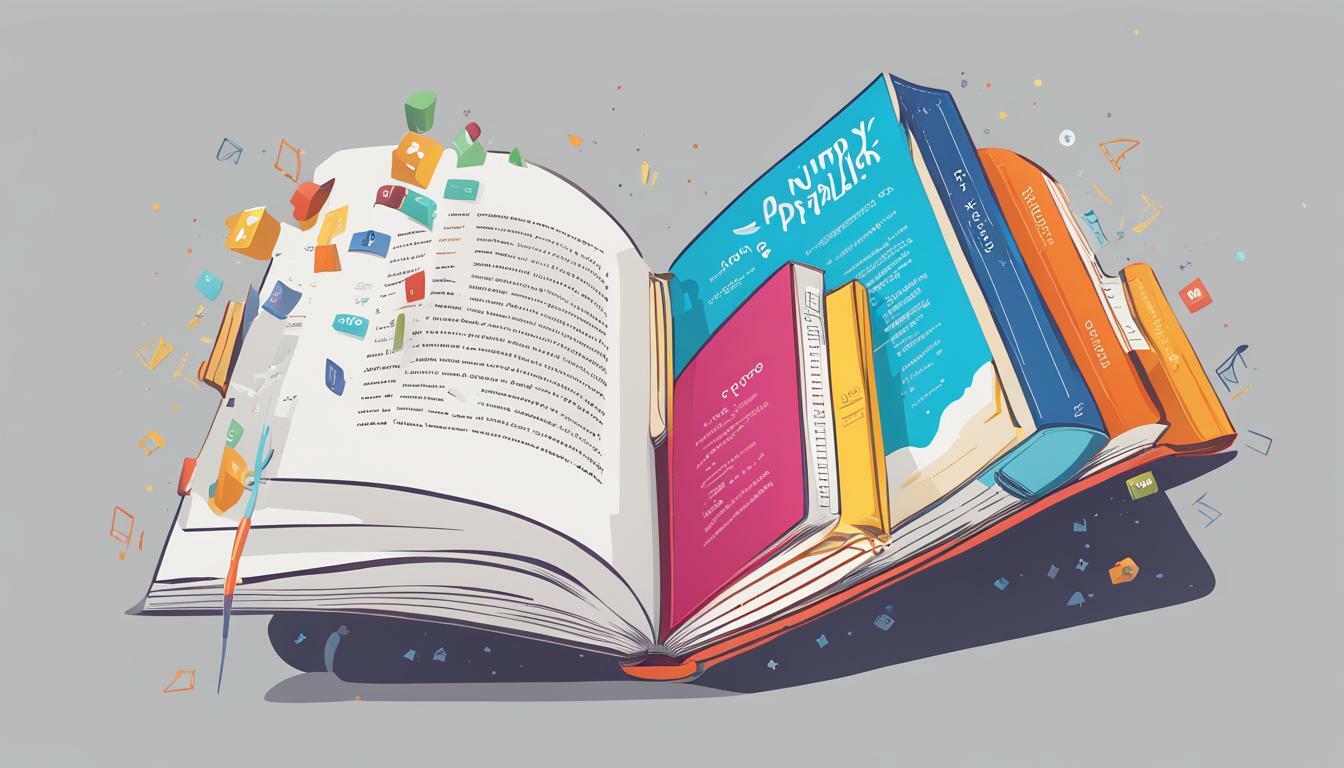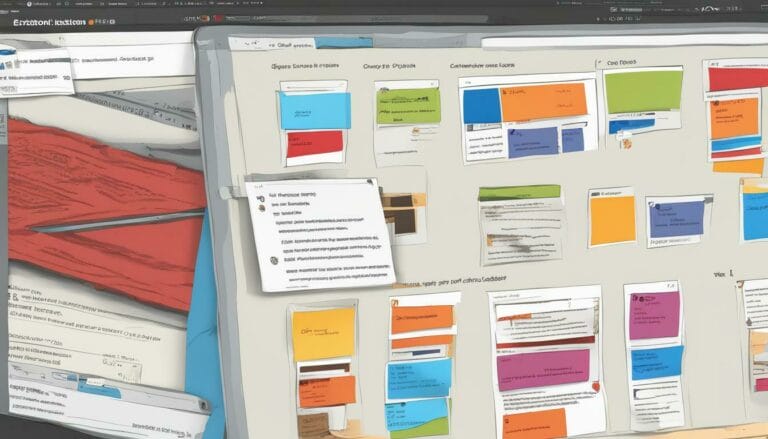Master the Basics: Guide to Learning Python Quickly

Key Takeaways:
- Python is a valuable asset in various industries and can boost your tech skills.
- Learning Python quickly is achievable and rewarding.
- This guide will provide an accelerated Python learning path that covers the necessary fundamentals of the language.
Why Learn Python?
Python is a powerful and versatile programming language that is perfect for beginners. Whether you are interested in data analysis, machine learning, or web development, Python is an excellent starting point. One of the reasons why Python is so popular is its simplicity. Python programming basics are easy to learn, and the code is easy to read and write. This simplicity makes Python a great language for beginners who are just starting to learn programming fundamentals. Python for beginners is also a great choice because of its versatility. Python can be used for a wide range of applications, from building websites to creating data visualizations. This makes it an essential skill to have in today’s tech-focused world. Whether you are interested in pursuing a career in tech or simply want to learn a new skill, Python programming basics are an excellent place to start. With its simplicity and versatility, Python is the perfect language for beginners.
“Python is a great language for beginners because of its simplicity and versatility.”
Getting Started with Python
Welcome to the first steps of your Python learning journey! As mentioned in the previous section, Python is a great language for beginners due to its simplicity and versatility. To get started, you will need access to a Python tutorial, and there are many available online. Some popular options include Codecademy, Python.org, and Udemy. These resources offer varying levels of difficulty and a step-by-step guide to learning Python. Before diving into Python code, you will need to ensure your computer has the necessary tools and installations. The most important tool is the Python interpreter- the program that reads and executes Python code. You can download it from the official Python website for free. Once Python is installed, you can also download an Integrated Development Environment (IDE) such as PyCharm or Spyder. These IDEs provide a more robust code editing experience that includes features like debugging and autocompletion. Now that you have your Python tutorial and tools in hand, it’s time to start coding! Don’t worry if you don’t understand everything at once; Python is designed to be easy to read and understand. Take your time, and soon you’ll be writing simple Python scripts with ease.Python Learning Resources
As you progress in your Python learning journey, you may encounter some challenging concepts. But don’t worry, there are plenty of resources available to help you. If you prefer interactive learning, consider joining an online Python community such as the Python subreddit or the Python Discord server. These forums allow you to ask questions and receive answers from experienced Python programmers. You can also find hundreds of Python blogs and newsletters to subscribe to, such as Python Weekly and Real Python. These resources offer advice and insights to help you sharpen your skills and stay up-to-date with the latest Python trends and best practices. In addition to blogs and communities, there are plenty of Python books available for purchase. Some popular options include “Python Crash Course” by Eric Matthes and “Learning Python” by Mark Lutz. These books offer a comprehensive guide to learning Python and can act as a reference for more advanced concepts. With these resources at your disposal, there’s no limit to how much you can learn and accomplish with Python. Happy coding!
Python Syntax and Fundamentals
Understanding Python programming basics is fundamental to mastering the language. Python is known for its simple, easy-to-read syntax, making it an ideal programming language for beginners. In this section, we’ll cover some of the core Python concepts to give you a solid foundation in the language. Whether you’re new to programming or just looking to refresh your Python skills, this Python crash course will get you up to speed quickly. First, let’s talk about variables. In Python, variables are used to store data values. You can assign a value to a variable using the = operator. For example:| Code | Output |
|---|---|
| x = 5 | |
| print(x) | 5 |
- Numbers (integers, floats, complex numbers)
- Strings (text)
- Booleans (True or False)
- Lists (ordered collections of values)
- Tuples (similar to lists, but immutable)
- Sets (unordered collections of unique values)
- Dictionaries (unordered collections of key-value pairs)
Python Libraries and Modules
Accelerate your Python learning with libraries and modules. These pre-built components can save you time and effort while enhancing your coding capabilities, making them a fundamental part of Python programming basics. Python has a vast array of libraries and modules available, each with its own unique purpose and functions. Using these will allow you to work more efficiently, and with the right knowledge, they can help you accomplish tasks in a few lines of code that would otherwise take hundreds. Some of the most popular libraries and modules in Python include:| Name | Description |
|---|---|
| NumPy | A library for working with large, multidimensional arrays and matrices. |
| Pandas | A library for working with data structures such as data frames and series. |
| Matplotlib | A library for creating data visualizations such as line charts, scatter plots, and histograms. |
 Accelerate your Python learning with essential libraries and modules.
Accelerate your Python learning with essential libraries and modules.
Python Best Practices
As you continue to learn Python programming basics, it’s important to practice writing clean and efficient code. These best practices will help you stay organized and write code that is easy to read and maintain. Code Readability: Writing code that is easy to read and understand is crucial in programming. Use descriptive variable names, comments, and proper indentation to make your code easy to follow. This will also make it easier for others to read and collaborate on your code. Naming Conventions: Use a consistent naming convention for variables, functions, and classes. This makes your code more readable and makes it easier to understand the purpose of each component. Error Handling: When writing code, you should always anticipate and handle errors that may occur. Use try-except blocks to handle exceptions and prevent your code from crashing. Code Optimization: Writing efficient code is important for both speed and memory usage. Use built-in Python functions and modules when possible to avoid reinventing the wheel. Also, refactor your code to reduce redundancy and improve performance. Following these best practices will not only make your code easier to read and maintain, but also improve your fast Python learning. Keep practicing and applying these practices to your code to become a proficient Python programmer.
Advanced Python Concepts
By now, you should have a solid understanding of Python programming basics. In this section, we’ll delve into more advanced concepts that will help you tackle more complex projects.Object-Oriented Programming
Object-oriented programming (OOP) is a popular programming paradigm that helps organize code by creating objects, which are instances of classes. Python is an object-oriented language, which means it has built-in support for OOP. One of the key concepts of OOP is inheritance, where a child class inherits properties and methods from a parent class. This allows for code reusability and makes it easier to create and maintain large programs.File I/O Operations
Working with files is a common task in most programming languages, and Python is no exception. In Python, you can read and write to files using file I/O operations. Theopen() function is used to open files in Python. You can specify the mode of the file, such as read, write, or append mode. Once you have opened a file, you can then read or write to it using the appropriate methods.
Regular Expressions
Regular expressions are a sequence of characters that define a search pattern. They can be used to search, replace, or manipulate text in Python. Python has a built-in module calledre that provides support for regular expressions. You can use regular expressions to search for patterns in strings, such as email addresses or phone numbers.
Exception Handling
Exception handling is the process of handling errors or unexpected events that may occur during program execution. In Python, you can handle exceptions using thetry...except statement.
The try block contains the code that may raise an exception, and the except block specifies how to handle the exception. You can also use the finally block to specify code that should be executed regardless of whether an exception was raised or not.
Mastering these advanced Python concepts will take your programming skills to the next level. Keep practicing and exploring different Python libraries and modules to become a proficient Python programmer.

Is Installing Python on Chromebook a Necessary Step in Learning Python Quickly?
It’s not strictly necessary to have Python installed on a Chromebook in order to learn Python efficiently. Though having Python directly on your device may offer some advantages, you can also opt for online Python interpreters or alternate coding spaces. Prioritize understanding the language and the application of coding principles, rather than simply relying on Python’s set-up on a Chromebook.
Can Learning Python Help Software Engineers with Math Skills?
Learning Python can greatly contribute to mastering math for software engineers. Python’s extensive libraries, such as NumPy and SciPy, provide powerful mathematical functions and tools. Its simplicity and readability make it easier to implement complex mathematical algorithms, helping software engineers tackle mathematical problems more efficiently.
Python Online Courses and Further Learning Resources
As you continue your Python learning journey, you may want to explore online courses and other learning resources to enhance your skills. Here are some popular options:Online Courses
Udemy offers a variety of Python courses, from beginner to advanced levels. Their courses are self-paced and include video lectures and assignments. Coursera also has a range of Python courses from top universities such as MIT and the University of Michigan. These courses are taught by industry professionals and include quizzes, projects, and a community forum for discussion. edX also offers Python courses from top universities such as Harvard and Berkeley. These courses are free to audit, with the option to pay for a verified certificate. They include interactive exercises, coding challenges, and project-based learning.Learning Resources
If you prefer to learn through online tutorials and documentation, Python.org provides an extensive documentation library, including a tutorial for beginners. W3Schools also has a comprehensive Python tutorial that covers the basics as well as advanced topics such as file handling and regular expressions. Stack Overflow is a popular Q&A forum where developers can ask and answer technical questions. It is a great resource for troubleshooting and gaining insight into common coding challenges. GitHub is a platform for version control and collaborative coding. It is an excellent resource for finding and contributing to open-source Python projects. Remember, there is no one-size-fits-all approach to learning Python. Experiment with different resources to find what works best for you.





